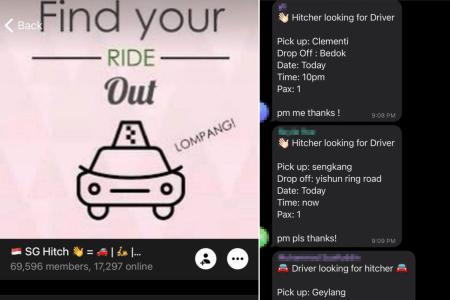Private carpooling services still in demand despite ban
With no contact tracing or possibly even safe distancing, experts say the practice is risky and foolish
It has been banned for more than a year, but privately arranged trips still appear to be in demand today.
Even as Singapore grapples with a spike in Covid-19 cases, scores of members continue to make arrangements through Telegram chat groups such as SG Hitch and Singapore Secret Students Free Hitch, posting their pick-up location and desired destination, waiting for drivers to message them privately to work out a price.
This could mean a number of passengers from different households sharing a car with the driver and without safe distancing.
In response to queries, the Land Transport Authority (LTA) referred The New Paper to an advisory on its website, which says that a "medium such as Telegram's SG Hitch, continues to be disallowed as such car-pooling trips do not have proper records for contact tracing when required".
Dr Ling Li Min, an infectious disease physician from Rophi Clinic, emphasised the importance of contact tracing in the virus fight.
"Travelling with others from the general public is risky," she said.
"Being in a confined space and sitting in close proximity to others for a prolonged period of time increases the risk of being infected if someone has a Covid infection.
"While MRT, taxis or private-hire vehicles have contact tracing capabilities like scanning of safe entry codes or the recording of one's personal details, such informal carpooling arrangements do not. This will make it difficult to trace or isolate potential Covid cases and their contacts should the need arise, which can lead to more transmission and more clusters."
SG Hitch has about 70,000 members, and there are hundreds of people seeking rides in the chat group every day.
When The New Paper put up posts over the last few days seeking drivers for trips for one or two people, there were several responses looking to charge between $12 and $15 a ride.
Privately arranged carpooling services were previously allowed as long as drivers collected only enough to cover the cost of a trip. They could offer just two such rides a day.
BANNED
But the LTA banned all carpooling services on April 16 last year during the circuit breaker because of concerns over contact tracing and safe distancing during rides.
In February this year, a man was sentenced to three days' jail after being convicted of providing illegal carpooling services during the circuit breaker period.
He used the SG Hitch group - at the time called "Covid-19 Lockdown SG Hitch" - and was nabbed after he picked up two "passengers" who turned out to be LTA officers.
After carpooling services were forced to stop in April last year, those that were made through booking apps such as Grab and local ride-hailing operator Ryde were allowed to revive the service from June 19, almost three weeks after the circuit breaker ended on June 1.
Both operators had the contact-tracing feature.
Both Grab and Ryde have now had their carpooling service suspended again following the growing number of local virus cases, with the LTA announcing on Sunday that all forms of commercial carpooling services are no longer allowed.
If found guilty, drivers who provide such services can be prosecuted under the Road Traffic Act, for the use of an unlicensed vehicle to provide transport services.
They can be fined a maximum of $3,000, or be jailed for up to six months, or both.
They could also be prosecuted under the Motor Vehicles (Third-Party Risks and Compensation Act) for using a vehicle not properly insured to ferry passengers.
Infectious disease specialist Leong Hoe Nam, said: "While we may want to save money, carpooling is not advisable - it is penny-wise pound-foolish.
"We should try to keep within the same social pooling as much as possible as interacting with many different people in close proximity in a confined space like a car can increase the risk of transmission.
"We should ensure we minimise interaction with people not in our household as much as possible."
His colleague, Dr Ling, said that with the increase in community clusters and variants of the virus, minimising movement is the best way to curb further spread.
"We still should try to stay home as much as we can to stem the rise in clusters quickly," she said.
"The pain we bear now is so we can savour the fruits of this sacrifice as early as possible."
ADDITIONAL REPORTING: HEDY YANG
Get The New Paper on your phone with the free TNP app. Download from the Apple App Store or Google Play Store now


